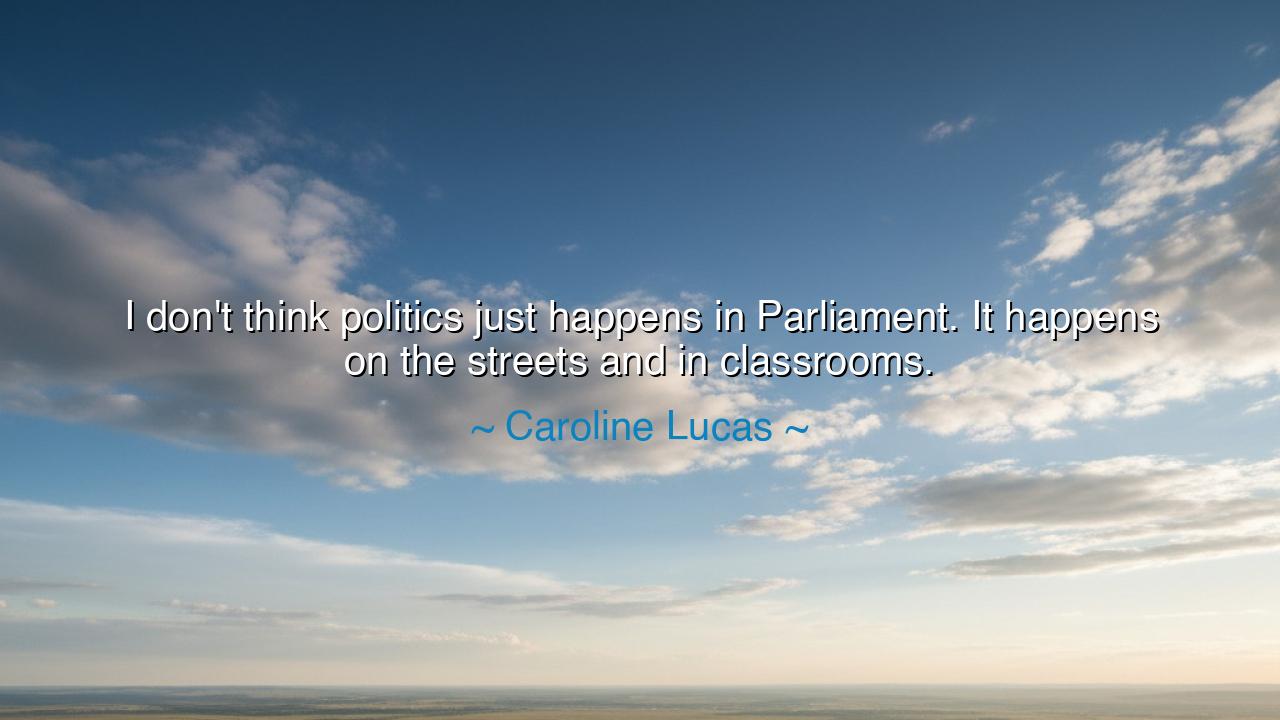
I don't think politics just happens in Parliament. It happens on
I don't think politics just happens in Parliament. It happens on the streets and in classrooms.






Hear, O children of conscience, the words of Caroline Lucas, champion of the Green cause in Britain, who declared: “I don’t think politics just happens in Parliament. It happens on the streets and in classrooms.” In this utterance lies a profound reminder: politics is not only the craft of lawmakers in lofty halls, but the living pulse of ordinary people, shaping the world in every corner where voices are raised and ideas are sown.
For Parliament is but the stage of official power, where laws are written and debated. Yet the true origins of those laws are born in the cries of the people, in the chants of protestors, in the lessons shared by teachers, and in the dreams of the young. Politics on the streets is the fire of resistance, where the oppressed demand change. Politics in classrooms is the planting of seeds, where future generations learn to question, to imagine, and to act. Without these, Parliament itself would be barren, a hollow echo chamber cut off from life.
History bears witness. The American civil rights movement was not first decided in Congress, but in the marches of Selma, the boycotts of Montgomery, and the sit-ins at lunch counters. It was the courage of ordinary citizens, walking and teaching and risking all, that forced the hand of lawmakers. In truth, politics on the streets gave birth to the Civil Rights Act, proving Lucas’s words across time and nation.
So too with education: the ideas nurtured in classrooms often become the revolutions of tomorrow. The Enlightenment thinkers, taught in universities and salons, prepared the ground for revolutions in France and America. Children who learn justice, equality, and stewardship of the earth will one day carry those lessons into every sphere of life, shaping a politics rooted not only in power, but in wisdom.
Therefore, let this wisdom be remembered: politics is not the possession of rulers, but the inheritance of all. It thrives wherever people gather, learn, protest, and dream. Caroline Lucas’s words call us to vigilance and to hope—that change does not wait for the chambers of Parliament, but is already being written in the courage of the streets and in the quiet power of classrooms. For in these places, the true soul of democracy is born.






Uudud
Lucas’ quote also suggests that political change often begins with personal and communal actions, whether on the streets or in classrooms. But, can these informal spaces sometimes be counterproductive? Are there risks that movements started in these places may lack coherence or direction? How do we ensure that these informal spaces work together with formal political institutions to create meaningful, lasting change?
MHLe Minh Huy
It’s refreshing to hear someone remind us that politics is everywhere, not just in government buildings. This quote speaks to the way people’s daily lives, concerns, and struggles can shape the political landscape. But do we sometimes forget that not all discussions on the streets or in classrooms are politically informed or constructive? How can we create spaces that foster more thoughtful and inclusive political dialogue?
XDphan thao nguyen xinh dep
I love how Caroline Lucas broadens our understanding of where politics takes place. But I wonder: Does this quote downplay the importance of traditional political systems like Parliament? Are there risks to relying too much on public spaces or informal education to shape policy, or can they create a more vibrant and participatory democracy? Could this shift ultimately lead to more polarization if not managed carefully?
TPToan Pham
Lucas’ words feel especially relevant in today’s social media-driven world, where debates and protests happen in real-time across all spaces. Politics isn’t just about legislation—it’s about how people engage with each other in everyday environments. But, does this mean that politics is always a reflection of the will of the people, or could it also be shaped by louder, more vocal minorities? How can we ensure that all voices are heard equally?
MNNguyen Thi Minh Ngoc
This quote highlights how politics extends beyond the formal realm of Parliament. I wonder, though, whether street politics and classroom discussions are always constructive. Can politics in these spaces sometimes veer into chaos or misinformation? What responsibility do individuals have to ensure these conversations are informed and respectful? How do we strike a balance between grassroots activism and organized political systems?